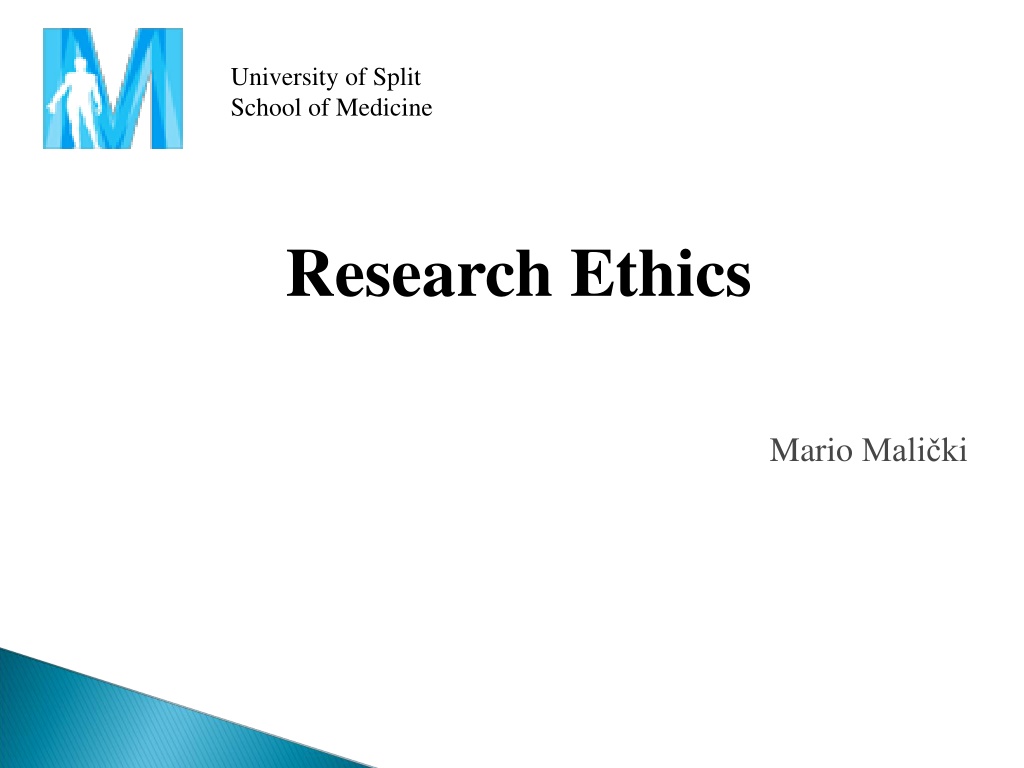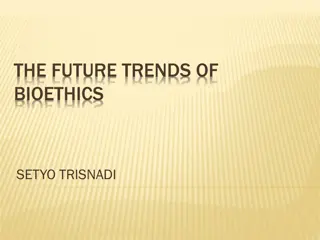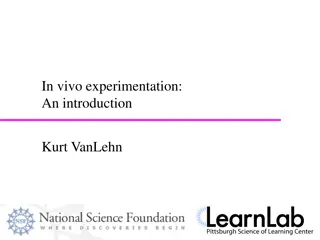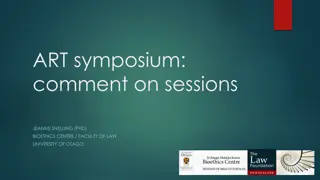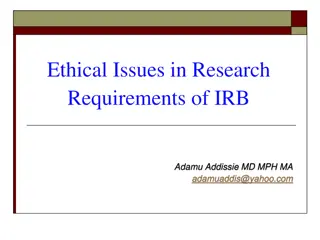Exploring Research Ethics in Human Experimentation and History of Bioethics
Delve into the complexities of research ethics, focusing on human and animal experimentation, environmental ethics, and publication ethics. Learn about the critical evaluation of dilemmas in research, research integrity, and the moral code of academia. Understand the definition of research with human subjects according to the WHO Manual, and reflect on the historical context of Nazi human experimentation, Nuremberg trials, and sterilization legislation in the USA.
Uploaded on Oct 01, 2024 | 0 Views
Download Presentation

Please find below an Image/Link to download the presentation.
The content on the website is provided AS IS for your information and personal use only. It may not be sold, licensed, or shared on other websites without obtaining consent from the author. Download presentation by click this link. If you encounter any issues during the download, it is possible that the publisher has removed the file from their server.
E N D
Presentation Transcript
University of Split School of Medicine Research Ethics Mario Mali ki
Human Human experimentation Animal Animal experimentation Environmental Environmental ethics Publication Publication ethics
Research ethics critical evaluation of dilemmas arising from research Research integrity the moral code of the academia: the use of honest and verifiable methods in proposing, performing, and evaluating research; reporting research results
Human experimentation Human experimentation
The WHO Manual (Section XV.2) defines research with human subjects as 'any social science, biomedical, behavioural, or epidemiological activity that entails systematic collection or analysis of data with the intent to generate new knowledge which human beings: are exposed to manipulation, intervention, observation, or other interaction either directly or through alteration of their environment; or become individually identifiable investigator's collection, preparation, or use of biological material or medical or other records The WHO Manual (Section XV.2) defines systematic collection or analysis of data with the intent to generate new knowledge, in manipulation, intervention, observation, or other interaction with investigators become individually identifiable through
History History
Nazi human experimentation Nuremberg trials Nuremberg Code Nazi human experimentation Nuremberg trials Nuremberg Code
1933 Diseased Offspring (Ger. Gesetz zur Verh tung erbkranken Nachwuchses) 1933 Law for the Prevention of Genetically USA: Indiana became the first state to enact sterilization legislation in 1907, followed closely by California and Washington in 1909. ~60,000 till 1970s
(1) Any person suffering from a hereditary disease may be rendered incapable of procreation by means of a surgical operation (sterilization) (2) (2) For the purposes of this law, any person will be considered as hereditarily diseased who is suffering from any one of the following diseases: (1) Congenital Mental Deficiency, (2) Schizophrenia, (3) Manic-Depressive Insanity, (4) Hereditary Epilepsy, (5) Hereditary Chorea (Huntington s), (6) Hereditary Blindness, (7) Hereditary Deafness, (8) Any severe hereditary deformity. (3) Any person suffering from severe alcoholism may be also rendered incapable of procreation.
1934 - 62,400 sterilized 1935 - 71,700 sterilized Genetic Health Courts (Erbgesundheitsgericht) - 200 400,000 sterilized by the end of the WWII
Concentration camps since 1933. Till 1945 ~ 20 000 First extermination camps (Todeslager) 1941 - Final Solution to the Jewish question Che mno extermination camp (Vernichtungslager Kulmhof) in Poland. Aushwitz, Dachau, Buchenwald, Mauthausen, Ravensbr ck. Zyklon-B Hydrogen cyanide is a poisonous gas that interferes with cellular respiration Carbon monoxide
Heinrich Himmler visited the outskirts of Minsk in 1941 to witness a mass shooting. He was told by the commanding officer there that the shootings were proving psychologically damaging to those being asked to pull the triggers. Thus Himmler knew another method of mass killing was required. Auschwitz Commandant - Rudolf H ss
Military experiments Drug experiments Ratial motivation
Experiments on twins - change iris colour, conjoined twins Bone, muscle, and nerve transplantation experiments Head injury experiments Freezing experiments Malaria experiments Immunization experiments (malaria, typhus, tuberculosis, typhoid fever, yellow fever, and infectious hepatitis)
Mustard gas experiments - (ClCH2CH2)2S Sulfonamide experiments Sea water experiments Sterilization experiments Experiments with poison Incendiary bomb experiments High altitude experiments Blood coagulation experiments - Polygal
1984 45 citations Dachau - Metodology criticism
International International Law Law Hague Conventions of 1899 and 1907 Hague Conventions of 1899 and 1907 Geneva Geneva protocol protocol 1925/1928 Geneva Geneva conventions1864/1906/1929/1949 1901 Noble peace prize Jean Henri Dunant Fr d ric Inter-Parliamentary Union) Jean Henri Dunant i i Fr d ric Passy Passy (Me unarodna lige za mir -
Charter of the International Military Tribunal Annex to the Agreement for the prosecution and punishment of the major war criminals of the European Axis - 8 August 1945 Charter of the International Military Tribunal Three categories of crimes were defined: crimes against peace, war crimes, crimes against humanity crimes against peace, war crimes, crimes against humanity
Doctors trial Doctors trial (officially United States of America v. Karl Brandt, et al.) as the first of 12 trials for war crimes of German doctors that the United States authorities held in their occupation zone in Nuremberg, Germany, after the end of World War II. 20 out of 23 were medical doctors Out of the 23, 7 were found not guilty, 10 were sentenced to death, and the rest were sent to prison form 10 years to lifetime.
Dr. for War Crimes six points defining legitimate medical research, in May 1947 4 more added Dr. Leo Alexander Leo Alexander had submitted to the Counsel Dr. Harold Dr. Andrew Harold Sebring Andrew Ivy Sebring, , judge Ivy judge Nurnber ki kodeks - August 1947
Nuremberg Code Nuremberg Code 1. Required is the voluntary, well-informed, understanding consent of the human subject in a full legal capacity. The experiment should aim at positive results for society that cannot be procured in some other way. It should be based on previous knowledge (like, an expectation derived from animal experiments) that justifies the experiment. The experiment should be set up in a way that avoids unnecessary physical and mental suffering and injuries. It should not be conducted when there is any reason to believe that it implies a risk of death or disabling injury. 2. 3. 4. 5.
6. The risks of the experiment should be in proportion to (that is, not exceed) the expected humanitarian benefits. 7. Preparations and facilities must be provided that adequately protect the subjects against the experiment s risks. 8. The staff who conduct or take part in the experiment must be fully trained and scientifically qualified. 9. The human subjects must be free to immediately quit the experiment at any point when they feel physically or mentally unable to go on. 10.Likewise, the medical staff must stop the experiment at any point when they observe that continuation would be dangerous.
Tuskegee Study of Untreated Syphilis in the Negro Male Tuskegee Study of Untreated Syphilis in the Negro Male 1932-1972 399 sifilis 201 zdravih 1947 penicilin javno dostupan Ponoviti studiju iz Osla na bijelcima 1964 Helsin ka deklaracija 74 umrlo +100 od komplikacija 40 zena zarazeno, 19 djece rodjeno s kongenitalnim sifilisom
9 billion dollars USA paid to the victims May 16, 1997 - Bill Clinton and held a ceremony at the White House for surviving Tuskegee study participants (5 od 8 prisustvovalo) Bill Clinton formally apologized
1979 BELMONT REPORT The three fundamental ethical principles for using any human subjects for research are:[2] 1979 BELMONT REPORT Respect for persons: protecting the autonomy of all people and treating them with courtesy and respect and allowing for informed consent. Researchers must be truthful and conduct no deception; Beneficence: The philosophy of "Do no harm" while maximizing benefits for the research project and minimizing risks to the research subjects; and Justice: ensuring reasonable, non-exploitative, and well- considered procedures are administered fairly the fair distribution of costs and benefits to potential research participants and equally.
According to the Research Ethics Committee in Croatia (Split) researcher is obligated to respect: Helsin ku deklaraciju Kodeks medicinske etike i deontologije (NN 55/08) Pravilnik o klini kim ispitivanjima lijekova i dobroj klini koj praksi (NN 25/2015 i 125/2015) Zakon o zdravstvenoj za titi Republike Hrvatske (NN 150/08, 71/10, 139/10, 22/11 i 84/11) Zakon o pravima pacijenata Republike Hrvatske (NN 169/04, 37/08)
Declaration of Helsinki 1964: Original version. 18th Meeting, Helsinki 1975: First revision. 29th Meeting, Tokyo 1983: Second revision. 35th Meeting, Venice 1989: Third revision. 41st Meeting, Hong Kong 1996: Fourth revision. 48th Meeting, Somerset West (SA) 2000: Fifth revision. 52nd Meeting, Edinburgh 2002: First clarification, Washington 2004: Second clarification, Tokyo 2008: Sixth revision, 59th Meeting, Seoul 2013: Seventh revision, 64th Meeting, Fortaleza 1964 WMA (World Medical Association)
Points Points Risks, Burdens and Benefits Vulnerable Groups and Individuals Research Protocols Research Ethics Committees Privacy and Confidentiality Informed Consent Use of placebo Post-Trial Provisions) Research Registration and Publication and Dissemination of Results Unproven Interventions in Clinical Practice
Kodeks medicinske etike i deontologije Istra iva ne smije utjecati na odluku ispitanika o sudjelovanju ili nesudjelovanju u terapijskom ili neterapijskom istra ivanju, osobito kada je ispitanik ovisan o istra iva u Zakon o pravima pacijenata Znanstveno istra ivanje nad poslovno nesposobnim pacijentom, pacijentom koji nije sposoban za rasu ivanje te nad maloljetnim pacijentom mo e se provesti jedino ako istra ivanje usporedive u inkovitosti ne mo e se provoditi nad pacijentima koji su sposobni dati pristanak
WHAT APPLIES TO MEDICAL STUDENTS Medical students and students of medical professions are obliged to keep the professional secrets. (Zakon o zdravstvenoj za titi) In receiving health services, each person has the right to refuse treatment by students and refuse all interventions independently performed by health care workers who have not passed the state exam and acquired the permit for independent work. (Zakon o za titi prava pacijenata)
Drug Drug phases phases
Example Example BIAL BIAL Phase Phase 1 1 One person has been left brain dead and five others are in serious condition after taking part in the clinical trial of an experimental painkiller made by Portuguese drug company Bial, the French Health Ministry said on Friday. The medicine involved works by targeting the body s pain-controlling endocannabinoid system, which is also responsible for the human response to cannabis. The ministry said the six volunteers in Rennes, in western France, had been in good health until taking the oral medication at a private facility that specializes in carrying out clinical trials.
